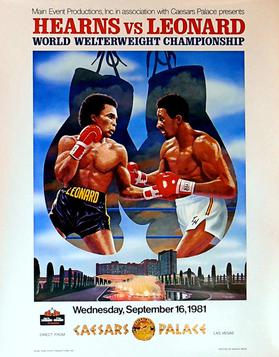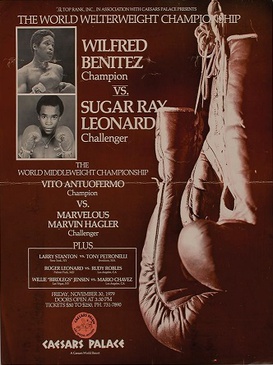Related Research Articles

Thomas Hearns is an American former professional boxer who competed from 1977 to 2006. Nicknamed the "Motor City Cobra", and more famously "The Hitman", Hearns's tall, slender build and oversized arms and shoulders allowed him to move up over fifty pounds (22.7kg) in his career and become the first boxer in history to win world titles in five weight divisions: welterweight, light middleweight, middleweight, super middleweight and light heavyweight.
Billy Backus, is a former World Welterweight Champion professional boxer. In the summer of 2006 Backus retired from his correctional facility job and moved to South Carolina.

Sugar Ray Leonard vs. Thomas Hearns, billed as The Showdown, was a professional boxing match contested on September 16, 1981, for the undisputed welterweight championship.

José Ángel Nápoles was a Cuban-born Mexican professional boxer. He was a two-time undisputed welterweight champion, having held the WBA, WBC, and The Ring welterweight titles between 1969 and 1975. He is frequently ranked as one of the greatest fighters of all time in that division and is a member of the International Boxing Hall of Fame. His record of the most wins in unified championship bouts in boxing history, shared with Muhammad Ali, was unbeaten for 40 years. After debuting professionally in Cuba, he fought out of Mexico and became a Mexican citizen.
José Isidro "Pipino" Cuevas González is a Mexican former professional boxer who competed from 1971 to 1989. He held the WBA welterweight title from 1976 to 1980.

Boxing in the 1980s was filled with important fights, events and personalities that shaped the sport. Boxing in the 1980s was shaped by many different situations, such as the continuous corporate battles between the different world sanctioning organizations, the void left by Muhammad Ali as the sport's ambassador and consequent search for a new boxing hero, the continuous presence of Don King as the sport's most famous promoter, the surge of rival promoters as Bob Arum, Butch Lewis and Murad Muhammad, and major rule changes. In 1986, Mike Tyson emerged as a fresh new face in the heavyweight division, which had seen a decline in champion quality level after Ali's retirement and, later on, after longtime WBC ruler Larry Holmes' prime. In addition, the IBF and WBO began operating.
During the 1970s, boxing was characterized by dominating champions and history-making rivalries. The decade had many superstars, who also had fierce rivals. Alexis Argüello, for example, who won the world Featherweight and Jr. Lightweight titles in the '70s, had to overcome Alfredo Escalera twice before the decade was over.
During the 1960s, boxing, like mostly everything else around the world, went through changing times. Notable was the emergence of a young boxer named Cassius Clay, who would, in his own words shock the world, declare himself against war, and change his name to Muhammad Ali.
Ángel Luis "Cholo" Espada Mangual is a Puerto Rican former professional boxer. He was the WBA's world Welterweight champion in 1975-76. A music lover, Espada also organized, during the late 1970s, a salsa orchestra.
Hedgemon Lewis was an American professional boxer and trainer. He held the NYSAC welterweight world title in 1972 and challenged for welterweight world championships on three occasions; the unified WBA, and WBC titles twice in 1971 and 1974; and the WBC title in 1976. As an amateur, he won the National Golden Gloves lightweight title in 1964 and the welterweight title in 1966.
Lennox Blackmoore is a Guyanese professional light/light welter/welter/light middle/middleweight boxer of the 1970s and 80s.
George Leslie "Bunny" Grant was a Jamaican professional feather/super feather/light/light welter/welterweight/light middleweight boxer of the 1950s, '60s and '70s who won the Jamaican lightweight title, Jamaican welterweight title, Central American light welterweight Title, Latin American junior welterweight title, and British Commonwealth lightweight title, and was a challenger for the World Boxing Council (WBC) light welterweight title and World Boxing Association (WBA) World light welterweight title against Eddie Perkins, Commonwealth welterweight title against Clyde Gray, his professional fighting weight varied from 125+1⁄2 pounds (56.9 kg), i.e. featherweight to 152+1⁄2 pounds (69.2 kg), i.e. light middleweight. Bunny Grant was managed by Jacques Deschamps, and Pancho Rankine, and trained by Harry Wiley. He died on 1 November 2018.
Ralph Charles is an English amateur welterweight and professional light welter/welter/light middle/middleweight boxer of the 1960s and '70s who as an amateur won the Amateur Boxing Association of England (ABAE) 1959 Junior Class-A title against Kenneth "Ken"/"Kenny" J. Cooper, boxing out of West Ham Boys & ABC, won the Amateur Boxing Association of England (ABAE) 1960 Junior Class-B title against J. Harwood, boxing out of West Ham Boys & ABC, and was runner-up for the 1963 Amateur Boxing Association of England welterweight title, against Johnny Pritchett, boxing out of West Ham ABC, and as a professional won the British Boxing Board of Control (BBBofC) Southern Area welterweight title, BBBofC British welterweight title, European Boxing Union (EBU) welterweight title, and Commonwealth welterweight title, and was a challenger for the World Boxing Council (WBC) welterweight title, and World Boxing Association (WBA) World welterweight title against José Nápoles, his professional fighting weight varied from 140 lb, i.e. light welterweight to 157 lb, i.e. middleweight.
Wilfredo Rivera is a Puerto Rican former professional boxer who fought three times for world titles, losing to Pernell Whitaker twice and to Oscar De La Hoya.
Arturo Leon is a Mexican-American former boxer from Arizona, United States. He was a junior lightweight who once challenged Alexis Arguello for the Nicaraguan's World Boxing Council's world Junior Lightweight title, losing by 15 round unanimous decision.
Anthony Perez was an American boxing referee and judge of Puerto Rican descent. During his career, he refereed many major boxing fights and participated in a number of boxing related documentaries.
Hannah Rankin is a Scottish professional boxer and bare-knuckle boxer. In boxing she has held the WBA and IBO female super-welterweight World titles.
Jason Welborn is an English professional boxer who challenged once for the unified WBA (Super), IBF and IBO light-middleweight titles in 2018. At national level, he held the British middleweight title in 2018, and challenged for the British welterweight and light middleweight titles in 2013 and 2014 respectively, and the Commonwealth light-middleweight and middleweight titles in 2019 and 2020 respectively.

Wilfred Benítez vs. Sugar Ray Leonard was a professional boxing match contested on November 30, 1979, for the WBC and The Ring welterweight titles.
Larry Hazzard Sr. is a former amateur boxer, boxing referee, athletic control board commissioner, teacher and actor. He is a member of the International Boxing Hall of Fame, being inducted during 2010. Hazzard has served as Commissioner of the New Jersey State Athletic Control Board since 2014, his second stint as commissioner after serving from 1985 to 2007.
References
- ↑ "Statistics at boxrec.com". boxrec.com. 31 December 2013. Retrieved 1 January 2013.